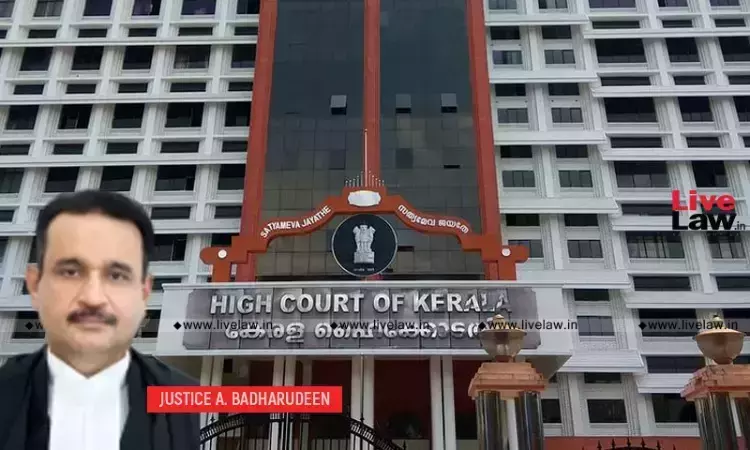- Home
- /
- High Courts
- /
- Kerala High Court
- /
- High Courts Cannot Reduce Sentence...
High Courts Cannot Reduce Sentence Below The Statutory Minimum: Kerala High Court
K. Salma Jennath
9 Oct 2025 3:42 PM IST
The Kerala High Court has recently clarified that High Courts cannot reduce the sentence for a criminal offence below the minimum punishment prescribed by a statute. Justice A. Badharudeen relied on the recent decision of the Supreme Court in Dashrath v. State of Maharashtra to observe that such an action would be overstepping into the legislature's domain. The case before the Court was an...
The Kerala High Court has recently clarified that High Courts cannot reduce the sentence for a criminal offence below the minimum punishment prescribed by a statute.
Justice A. Badharudeen relied on the recent decision of the Supreme Court in Dashrath v. State of Maharashtra to observe that such an action would be overstepping into the legislature's domain.
The case before the Court was an appeal preferred by a Village Assistant challenging conviction and sentence passed by the Special Judge. He was sentenced to undergo 4 years and 5 years of rigorous imprisonment and to pay Rs. 50,000 each as fine respectively for the commission of offences under Sections 7 and 13(1)(d), 13(2) of the Prevention of Corruption Act, 1988.
The prosecution had alleged that the appellant/accused had demanded a bribe of Rs. 25,000 from PW1 as a reward for not reducing the value of improvements of the land acquired for the Cochin International Airport and for disbursing the compensation payable. After the accused accepted an initial amount of Rs. 10,000/-, a trap was laid and he was caught on 19.09.1997 with the balance Rs. 15,000/- by the trap team.
The appellant claimed that he was merely a scapegoat and the actual bribe was demanded by the Deputy Collector (LD) and the Special Tahsildar, while the appellant accepted the bribe thinking it to be part of a chitty transaction. These two officers were initially arrayed as accused in the FIS but excluded from the final report.
Later, PW1 had deposed that these two persons demanded bribe from him and they were arrayed again by the Special Judge as additional accused. But the High Court set aside the arraignment and the appellant was, once again, the sole accused.
The appellant contended that since the demand of bribe is not proved to be done by him, the ingredients of the offences, i.e., demand and acceptance, are not satisfied.
The Court noted that during cross-examination, PW1 had reiterated that the appellant demanded Rs. 25,000/- when he came to inspect PW1's land marked for acquisition and thereafter, in his office.
It went on to see what are the essential ingredients to attract the offences under Sections 7, 13(1)(d) and 13(2) of the PC Act. It remarked that the position was clearly laid down in the Apex Court decision of Neeraj Dutta v. State (Govt of NCT of Delhi) and Kerala High Court decision in Sunil Kumar K. v. State of Kerala [2025 KHC 983].
It observed:
"Regarding the mode of proof of demand of bribe, if there is an offer to pay by the bribe giver without there being any demand from the public servant and the latter simply accepts the offer and receives the illegal gratification, it is a case of acceptance as per Section 7 of the Act. In such a case, there need not be a prior demand by the public servant. The presumption of fact with regard to the demand and acceptance or obtainment of an illegal gratification may be made by a court of law by way of an inference only when the foundational facts have been proved by relevant oral and documentary evidence and not in the absence thereof. On the basis of the material on record, the Court has the discretion to raise a presumption of fact while considering whether the fact of demand has been proved by the prosecution or not."
The appellant also argued that the sentence in this case can be modified in tune with the decision in Pounammal K. v. State [2025 KHC 6718], where the Supreme Court modified the sentence for the period already undergone.
Addressing this argument, the Court noted that the modification by the Apex Court in the case was by invoking the power under Article 142 of the Constitution of India, which is not bestowed on High Courts.
It also referred to Dashrath's case and observed:
"Going by the decision in Dashrath's case (supra), the power under Article 142 of the Constitution of India also could not be invoked to reduce a sentence than the minimum sentence provided by the statute, as the same would amount to legislation by the Court overstepping on the domain of the legislature, which is impermissible."
Further, the Court felt that all the evidence on record, including the material objects and deposition of witnesses, were rightly appreciated by the Special Judge. Regarding the one day's delay in the registration of the FIR, the judge opined that it was too short a delay, especially since trap was laid in one district and the FIR was registered in another.
However, the Court was of the opinion that the sentence awarded to the appellant could be modified and the minimum prescribed in the statute was awarded.
Thus, it partially allowed the appeal.
Case No: Crl.A. No.1473 of 2006
Case Title: A.K. Rajendran v. State of Kerala
Citation: 2025 LiveLaw (Ker) 642
Counsel for the appellant: R. Anil, Delvin Jacob Mathews, George Philip, Raju Radhakrishnan
Counsel for the respondent: Rekha S. - Senior Public Prosecutor
Click to Read/Download Judgment



